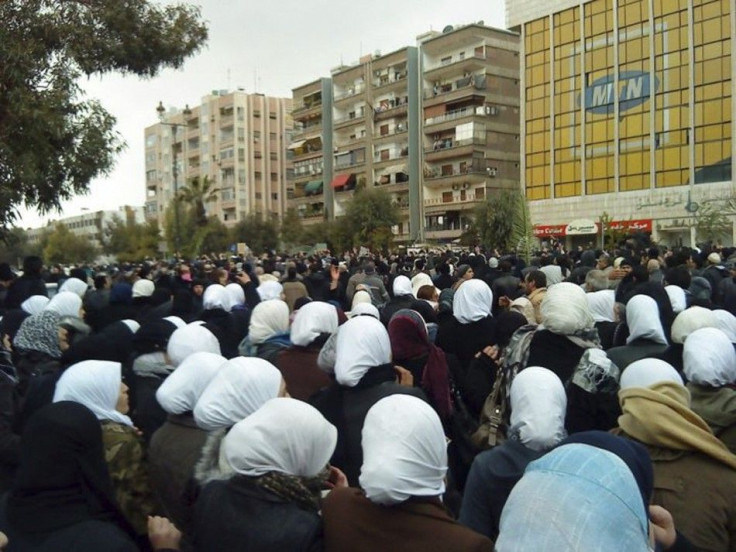Syrian Security Forces Tighten the Screws on Damascus

(Reuters) -- Police and pro-regime militia patrols fanned out in Damascus' Mezze district Sunday to prevent a repeat of protests against President Bashar al-Assad that have threatened his grip on the capital, opposition activists said.
On the international front, China said it believed a peaceful solution to the Syrian crisis was still possible, but Britain's foreign minister said he feared the Middle Eastern country will slide into civil war.
China's official Xinhua news agency reflected Beijing's view a day after a Chinese envoy met Assad in Damascus while thousands of Syrians demonstrated in the heart of the capital in one of the biggest anti-government rallies there since a nationwide uprising started nearly a year ago.
Early Sunday morning, the body of Samer al-Khatib, a young protester who was killed when security forces opened fire on the protest, was buried in Mezze.
Security forces maintained a heavy presence to prevent the funeral from turning into an anti-Assad demonstration, opposition activists contacted by Reuters from Amman said.
Fifteen pick-up trucks carrying security police and armed pro-Assad militiamen, known as shabbiha, surrounded the funeral as Khatib was buried quietly, they said.
Police cars and militia jeeps patroled Mezze while secret-police agents spread out on foot, stopping men at random and checking their identification cards, they said.
Walking in Mezze now carries the risk of arrest. The area is quiet, and even the popular food shops in Sheikh Saad are empty, activist Moaz al-Shami said, referring to a main street.
The Damascus protest indicated the movement against Assad, who has ruled Syria for 11 years after succeeding his father Hafez on his death, has not been cowed by repression and embraces a wide section of Syrian society.
Assad, who belongs to the Alawite sect, an offshoot of Shiite Islam, in a majority Sunni country, says he is fighting foreign-backed terrorists.
Saturday's shooting by security forces took place as a Chinese envoy, Foreign Minister Zhai Jun, met Assad and appealed to all sides to end the violence.
Zhai also expressed Beijing's support for Assad's plan to hold a referendum and multiparty elections within four months -- a move the West and some in Syria's fragmented opposition movement have dismissed as a sham.
China has emerged as a leading player in the multiple international efforts to end the bloodshed in Syria and is one of Assad's main defenders.
China believes, as many others do, there is still hope the Syria crisis can be resolved through peaceful dialogue between the opposition and the government, contrary to some Western countries' argument that time is running out for talks in Syria, the Xinhua commentary said.
It also criticized the West's stance, highlighting differences between foreign powers over how to deal with the conflict. Western countries were driven less by their self-proclaimed 'lofty goal' of liberalizing the Syrian people than by geopolitical considerations, Xinhua said.
The words might bring a measure of comfort to Assad, who is now generally reviled in the West for a crackdown in which his security forces have killed several thousand people.
China and Russia infuriated Western and Arab states this month by blocking a draft U.N. Security Council resolution that backed an Arab plan urging Assad to halt the repression and surrender power. They also voted against a similar, nonbinding U.N. General Assembly resolution that was overwhelmingly passed this week.
No Intervention
The United States, Europe, Turkey, and Persian Gulf-led Arab states have all demanded Assad leave office.
The West has ruled out any Libya-style military intervention, but the Arab League, spearheaded by Saudi Arabia, has indicated some of its member states were prepared to arm the opposition, which includes the rebel Free Syrian Army.
British Foreign Minister William Hague reiterated that view Sunday, telling the BBC: We cannot intervene in the way we did in Libya ... we will do many other things. ... I am worried that Syria is going to slide into a civil war and that our powers to do something about it are very constrained because, as everyone has seen, we have not been able to pass a resolution at the U.N. Security Council because of Russian and Chinese opposition.
Catch-22
A leading Syrian businessman, Faisal al-Qudsi, said the government was slowly disintegrating and that sanctions were ruining the economy.
Qudsi told the BBC in London military action could only last six months, but Assad's government would fight to the end. The army is getting tired and will go nowhere, he said. They will have to sit and talk or at least they have to stop killing. And the minute they stop killing, more millions of people will be on the streets. So they are in a Catch-22.
Qudsi, who was involved in Syria's economic liberalization, told the BBC the apparatus of government was almost nonexistent in trouble spots such as Idlib, Homs, and Deraa.
The opposition Local Coordination Committees said security forces killed 14 people in Damascus and other parts of the country Saturday, including five in the opposition stronghold of Homs. None of the figures could be verified independently.
Government forces bombarded Homs again Sunday. Strategically sited on the road between Damascus and commercial hub Aleppo, the western city has been under siege for more than two weeks, and a humanitarian crisis is developing as food and medical supplies to treat the wounded are running short.
Artillery, rockets, and sniper fire have killed several hundred people, according to activists' reports, but security forces have held back from a full invasion of opposition-held districts. Residents fear a bloodbath should that take place.
The Syrian Observatory for Human Rights said the attorney general for Idlib province, Nidal Gazal, a judge, and their driver were all killed Sunday morning when unidentified gunmen shot at their car.
(Additional reporting by Peter Griffiths in London and Marima Karouny in Beirut; Editing by Sophie Hares)
© Copyright Thomson Reuters 2024. All rights reserved.












